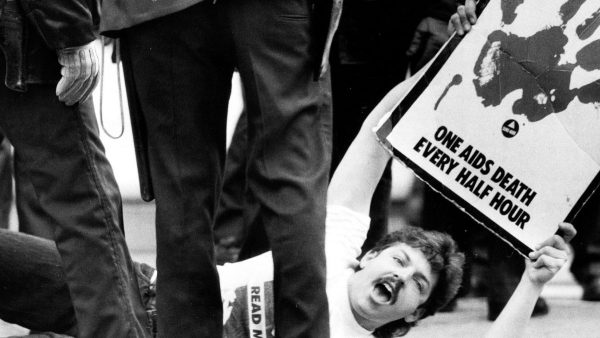
On this World AIDS Day, December 1, 2021, former members of the AIDS Coalition To Unleash Power Los Angeles (ACT UP / LA) announced their plans to launch an ACT UP / LA Oral History Project to capture historic AIDS activism in Los Angeles area from 1987 to 1997. Mary Lucey, Nancy MacNeil, Jordan Peimer, Helene Schpak and Judy Ornelas Sisneros spent the past year planning the project, which aims to document the movement that dominated the gay community throughout Los Angeles. the area for a decade, a galvanizing enterprise that demanded health care, dignity and human rights for thousands of those diagnosed with HIV + or with AIDS. ACT UP Los Angeles was a nonviolent direct action group that gathered in Plummer Park in West Hollywood during Ronald Reagan’s presidency, whose administration openly refused to acknowledge the growing AIDS crisis. AIDS had grown into an epidemic since the CDC’s first report on June 5, 1981, on the new disease in five gay men in Los Angeles (originally called Gay-Related Immune Deficiency or GRID).
These anti-gay prejudices and deliberate short-sightedness caused thousands to become infected and die due to neglect, greed and social stigma. Both the public and private health sectors, as well as cultural and religious institutions, deliberately assisted and collaborated in the escalation of the AIDS epidemic and AIDS phobia. Activists took a stand to confront and demand redress of positions like those of Los Angeles County Supervisor Pete Schabarum, rejecting the recommendations of the County AIDS Commission, saying, “If you were to ask the man on the street, I think you would find it great. The majority of the public really has no interest in the subject of AIDS and could certainly worry less about public funding, the necessary programs that you have formulated. ” ACT UP / Los Angeles was one of the earliest chapters and differed from them in many of the other cities around the world.
Notable differences include its intense focus, not only on the provision of a dedicated public AIDS department, which LA County was notorious for lacking, but also exceptional was ACT UP / LA’s focus on the lives of women and prisoners. ACT UP / LA marched against federal buildings, government buildings, LA County and City government offices, insurance companies, hospitals, churches, prisons, political fundraisers, the film and television industry, bigottes home and traveled out of town to protest in Congress, the pharmaceutical industry, the insurance industry, the CDC, the FDA, the NIH, international AIDS conferences, and presidential campaigns and conventions. Personal accounts of former ACT UP / LA activists will be preserved online, so people will learn the inner story of the organization’s actions and why members refused to sit back, while themselves, their family and / or friends and people in other marginalized communities were sick and dying.
During the 10 years of the group’s activism, the ACT UP / LA slogan “ACTION = LIFE” was practiced constantly. Interviews of former members have already taken place, each giving hours of personal stories of participating in constant activism while enduring endless cycles of grief. A sample of results from three interviews can be viewed on the ACT UP LA Oral History website: actupla.org. This project is expected to take an estimated 2-3 years and exceed 100 interviews once completed. The ACT UP / LA Oral History Project was launched over a year ago, although partly inspired by the similarities and differences between the AIDS crisis and the COVID-19 epidemic, and was mainly motivated by the continuing deaths among ACT UP / LA members whose history has not been preserved. “Not only were voices silenced by AIDS, but we now risk constantly losing the stories of the people who fought for their struggle – some with HIV / AIDS, some without – but all the people who risked their lives and freedom to address this loss, “says Oral History Project member Nancy MacNeil, adding:” We need to make sure the stories are told by the voices that lived them. Everyone has the right to self-determination in their own history.
To paraphrase the poet Dylan Thomas: ‘Let those who raged hard get their moment in the light, they did not go gently into the night.’ ”ACT UP / LA’s many successes include o Forcing the LA County Board of Supervisors to add the first AIDS Department at County / USC Medical Center. o To put pressure on the California Department of Crime to meet the health needs of AIDS inmates. o Getting the first compassionate release for a woman with AIDS who is imprisoned in the United States. o Work in coalition with other ACT UP departments around the country to extend the CDC’s AIDS definition to include opportunistic infections in women. o To challenge Hollywood’s AIDS phobia at the 1991 Oscars because the film industry failed to deal with the AIDS crisis.
This action helped erode negative Hollywood stereotypes of the queer society in the mainstream media. The creation of Clean Needles Now, the region’s first needle exchange program and forerunner of today’s LA Community Health Project. Los Angeles was actually the country’s first city to secure state aid for a needle exchange program. The ACT UP / LA Oral History Project has a great need for donations to fund this important collection of interviews. Without committed financial support, many stories of the aging community of Los Angeles AIDS activists will not be captured and preserved. We are currently in talks with several nationally accredited archival institutions. We want to ensure access not only for historians and researchers, but also the public. For more information go to: actupla.org or contact actuplaoralhistory@gmail.com

Post a Comment